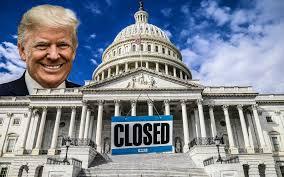
The federal government was partially shut down on December 22nd after lawmakers could not reach an agreement about funding for President Donald Trump's proposed border wall. The shutdown has now lasted into the New Year, with no indication of when it will end. This is the second longest U.S. government shutdown. The shutdown has affected air travel. Over the weekend, some airports had long lines at checkpoints, apparently caused by a rising number of security officers calling in sick while they are not getting paid. So far, the impact of the shutdown has been most visible for some government buildings and national parks being closed. If the shutdown continues, food stamp recipients will go without aid.
Generally, if the government closes for budgetary reasons, all but “essential” personnel are furloughed and are not allowed to work. Approximately 25 percent of government functions are shut down. Immigration-related agencies that are impacted by the shutdown include the Department of Homeland Security and its immigration-related components (CBP, ICE, USCIS, CIS Ombudsman), the Department of Justice (EOIR), and the Department of State.
Note that the Department of Labor (DOL) will not be impacted by a government shutdown. On September 28, 2018, President Trump signed a minibus appropriations bill funding DOL through the end of September 30, 2019.
Immigration Courts: Immigration court cases on the detained docket will proceed during the lapse in congressional appropriations while non-detained docket cases will be reset for a later date when funding resumes. Courts with detained dockets will receive all filings but will only process those involving detained dockets. Courts with only non-detained dockets will not be open and will not accept filings.
Boston Immigration Court: the Judges will hear only cases for individuals who are currently detained by Immigration Custom Enforcement in a local jail.
USCIS: USCIS is a fee-funded agency so if the government shuts down, it is generally business as usual. The exception to this is those programs that receive appropriated funds - E-Verify, the EB-5 Immigrant Investor Regional Center Program, Conrad 30 J-1 doctors, and non-minister religious workers. As announced by USCIS on January 20, 2018, those programs may be suspended or otherwise impacted. Note that while USCIS has not yet confirmed how cases will be processed post-shutdown, in 2013, USCIS accepted late I-129 filings provided the petition was submitted with evidence that the primary reason for failing to timely file an extension of stay or change of status request was the government shutdown.
DACA renewal: On January 21, 2018 USCIS has confirmed that processing will continue.
E-Verify accounts and Customer Service are closed: On January 22, 2018, USCIS confirmed that myE-Verify services are unavailable, including myE-Verify accounts, Self Check, Self Lock, Case History, and Case Tracker. USCIS also confirmed that E-Verify is unavailable, which means that employers will not be able to access their E-Verify accounts and Customer Service is closed. USCIS implemented temporary policies during the shutdown, including suspending the "three-day rule," extending the time in which employees may resolve Tentative Nonconfirmations (TNCs), and confirming that employers should not take adverse action against employees due to an interim case status during this time.
Department of State (US Embassies and Consulates): Visa and passport operations are fee-funded and should not be impacted by a lapse in appropriations, but operating status and funding will need to be monitored closely. If visa operations are affected, consular posts will generally only handle diplomatic visas and "life or death" emergencies.
Custom Border Protection: Inspection and law enforcement personnel are considered "essential." Ports of entry will be open; however, processing of applications filed at the border may be impacted.
Immigration Custom Enforcement: ICE enforcement and removal operations will continue, and ICE attorneys will typically focus on the detained docket during a shutdown. The ICE Student and Exchange Visitor Program (SEVP) offices are unaffected since SEVP is funded by fees.